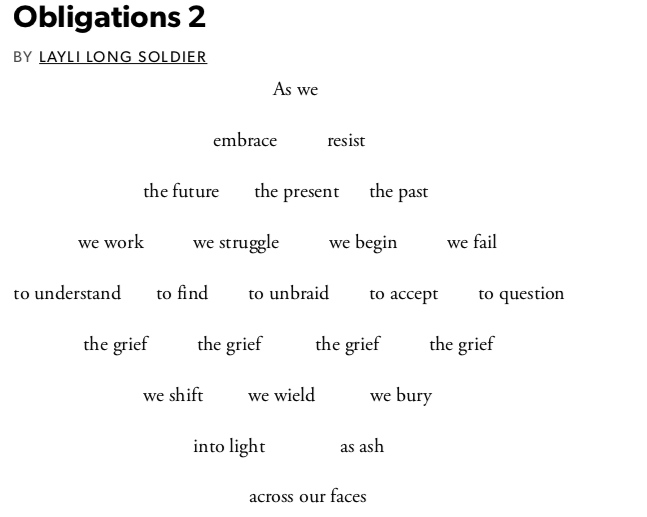5.6 miles
franklin loop
17 degrees / feels like 0
50% snow-covered
Warm air, warm sun. Another good run. Headed north and decided, at the last minute, to do the Franklin loop. Heard some geese, their honks congregating under the lake street bridge. Maybe some crows too? I know I heard another bird, but I can’t remember now. A black-capped chickadee? Definitely no woodpeckers. Running over the franklin bridge, I studied the river: all white, mostly flat, the edges a silvery shimmer. Later, nearing the trestle, I saw a few bits of black: open water. Encountered some other runners, walkers, at least one fat tire. As I reached the lake street bridge, I came up with a line for a swimming poem that I’m revisiting. I stopped on the bridge to record it into my phone.
Anything else? Most of what happened, what I thought about, got left somewhere out on the trail.
This morning, just as I was leaving for my run, the mail came, bringing the chapbook by Victoria Chang I ordered last week. I think they only made 200+ of them. It’s a small square book, bound with thin red twine. Very cool. I’d like to try making something like this. Titled, Another Lost Year, it is made up of short poems, all with W.S. Merwin titles. So many great ones. Here’s one I especially like. It happens to fall in the very middle of the book, where the red twine is exposed and tied in a knot.
Left Open / Victoria Chang
We can’t see beyond
the crest of the wooden gate.
We are carriers
of grass yet to be grown. We
aren’t made of cells, but of fields.
I like this idea of being a carrier of grass yet to be grown. My first thought was of grass on graves — Whitman’s “uncut hair of graves” or Dickinson’s “The color of the grave is green”. Then I thought of Gwendolyn Brooks’ “To the Young Who Want to Die”:
Graves grow no green that you can use.
Remember, green’s your color. You are Spring.
I like the idea of being made of fields, not cells. Here’s the original Merwin poem:
Left Open / W.S. Merwin
The shutters are rusted open on the north
kitchen window ivy has grown over
the fastenings the casements are hooked open
in the stone frame high above the river
looking out across the tops of plum trees
tangled on their steep slope branches furred
with green moss gray lichens the plums falling
through them and beyond them the ancient
walnut trees standing each alone on its
own shadow in the plowed red field full
of amber September light after so
long unattended dead boughs still hold
places of old seasons high out of the leaves
under which in the still day the first walnuts
from this last summer are starting to fall
beyond the bare limbs the river looks
motionless like the far clouds that were not
there before and will not be there again
